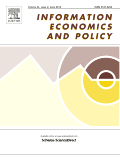
INFORMATION ECONOMICS AND POLICY
Scope & Guideline
Shaping policy through rigorous economic analysis.
Introduction
Aims and Scopes
- Impact of Information Technology on Economic Structures:
The journal investigates how information and communication technologies influence economic behavior, market structures, and competitive dynamics across various sectors. - Regulatory Frameworks and Market Dynamics:
It explores the implications of regulatory policies on information markets, including privacy regulations, net neutrality, and antitrust considerations in the digital economy. - Data Economics and Pricing Strategies:
Research often centers on data-driven pricing strategies, including algorithmic pricing, price discrimination, and the economic effects of adopting alternative payment models. - Social Implications of Digitalization:
The journal addresses the social impacts of information technology, including issues of financial inclusion, job market dynamics, and the effects of digital services on consumer welfare. - Comparative Analysis of Information Markets:
It provides comparative studies on the effectiveness of different market models, such as platform competition, mobile payments, and broadband infrastructure, across various geographical contexts.
Trending and Emerging
- Algorithmic Pricing and Market Behavior:
There is a rising trend in research exploring algorithmic pricing strategies, including behavior-based pricing and the implications of automated pricing mechanisms in various markets. - Impact of Broadband and Digital Infrastructure:
Recent publications emphasize the importance of broadband accessibility and digital infrastructure on economic growth, firm productivity, and social outcomes, highlighting its critical role in modern economies. - Financial Inclusion through Digital Payments:
The journal has seen an increase in studies related to mobile payments and financial inclusion, particularly in developing regions, as digital payment systems become essential for economic participation. - Data Regulation and Consumer Rights:
Emerging themes include the impact of data privacy regulations, such as GDPR, on market behavior and consumer rights, reflecting the growing importance of data ethics in economic policy. - Social Media's Economic Impact:
Research on the economic implications of social media, including its influence on political news dissemination and consumer behavior, is gaining prominence as digital platforms continue to shape market dynamics.
Declining or Waning
- Traditional Telecommunications Economics:
Research specifically centered on traditional telecommunications economics, such as fixed-line services and basic mobile communications, has seen a decline, possibly due to the shift towards more complex digital and mobile ecosystems. - Basic Economic Theories Applied to Digital Markets:
There is a noticeable decrease in the application of classical economic theories in the context of digital markets, as newer frameworks and methodologies that account for the complexities of digital interactions are gaining traction. - Focus on Purely Domestic Studies:
There appears to be a waning interest in studies that focus exclusively on domestic markets without considering international or comparative perspectives, as globalization and cross-border issues become more relevant.
Similar Journals
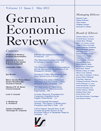
German Economic Review
Connecting Scholars Through Rigorous Economic AnalysisGerman Economic Review is a distinguished academic journal published by WALTER DE GRUYTER GMBH, focusing on diverse aspects of economics and econometrics. With its ISSN 1465-6485 and E-ISSN 1468-0475, the journal serves as a vital platform for disseminating high-quality research from both established scholars and emerging voices in the economic field. Housed in the UK, the journal contributes significantly to the academic community, evidenced by its placement in the Q3 category for Economics and Econometrics in 2023 and its Scopus ranking of #381 out of 716, reflecting its impactful presence in the discipline. German Economic Review does not offer open access options; however, its convergence from 2001 to 2024 indicates a long-standing commitment to advancing economic discourse. This journal is ideal for researchers, professionals, and students eager to engage with contemporary economic theories and applications.
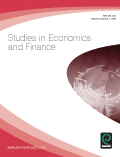
Studies in Economics and Finance
Empowering research that shapes economic policies.Studies in Economics and Finance is a distinguished journal published by Emerald Group Publishing Ltd, based in the United Kingdom. With an ISSN of 1086-7376 and an E-ISSN of 1755-6791, this journal has been a significant contributor to the fields of economics, econometrics, and finance since its inception, with coverage ranging from 1977 to the present. Ranked in the second quartile (Q2) for 2023 in its relevant categories, it holds a reputable position within the 83rd percentile in the general economics, econometrics, and finance fields according to Scopus rankings. This journal aims to disseminate cutting-edge research that addresses key issues and emerging trends in the economic and financial landscapes, fostering dialogue among scholars, practitioners, and policymakers. Although it does not operate under an Open Access model, Studies in Economics and Finance continues to be an essential resource for advancing knowledge and providing insights that are crucial for understanding complex economic behaviors and financial systems.

Journal of European Competition Law & Practice
Elevating Standards in European Legal ScholarshipJournal of European Competition Law & Practice, published by Oxford University Press, serves as a vital resource in the field of law, specifically focusing on competition law within the European context. With an ISSN of 2041-7764 and an E-ISSN of 2041-7772, this esteemed journal is dedicated to discussing contemporary issues, legal analysis, and policy implications surrounding competition law, and it enjoys a commendable Q2 ranking in the Law category according to Scopus. Researchers and professionals will benefit from its insightful articles, which span a broad spectrum of topics, including antitrust regulation, market dominance, and consumer protection. Although it is not an open-access journal, it provides valuable indexed content, boasting a robust presence in the legal scholarship community, particularly with a Scopus ranking of #449 out of 1025 in the social sciences law category, placing it in the 56th percentile. The journal's commitment to high-quality, peer-reviewed scholarship makes it essential reading for anyone involved in the study or practice of European competition law.

Journal of Energy Markets
Decoding the Complexities of Energy EconomicsJournal of Energy Markets, published by Incisive Media, is a vital platform dedicated to advancing the understanding of energy market dynamics, with an ISSN of 1756-3607 and an E-ISSN of 1756-3615. Established in the United Kingdom, the journal explores the intersection of economics, energy, and strategic management, serving as a key resource for researchers, professionals, and students alike. While the journal is currently categorized in the Q4 quartile across relevant fields such as Economics and Econometrics, it aims to stimulate scholarly dialogue, enhance empirical research, and present innovative methodologies in the rapidly evolving energy sector. Despite its nascent impact factor in 2023, the Journal of Energy Markets remains committed to publishing high-quality articles that address critical issues and trends affecting the global energy landscape. The journal is essential for those looking to deepen their knowledge and contribute to ongoing debates within this important field.

Australian Journal of Competition and Consumer Law
Fostering Critical Discourse on Competition LegislationThe Australian Journal of Competition and Consumer Law, published by LAWBOOK CO LTD, stands as a vital resource for scholars, practitioners, and students in the fields of competition law and consumer protection. With its ISSN 1838-9260, this journal offers insightful analyses and critical discussions that delve into contemporary issues, trends, and emerging challenges within the realm of competition and consumer legislation in Australia and beyond. Although it does not currently feature Open Access options, it is designed to foster a deeper understanding of legal frameworks and economic considerations affecting consumers and businesses. The journal is notable for its commitment to academic rigor and relevance, making it an essential publication for those seeking to navigate the intricacies of law in today's dynamic marketplace.
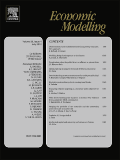
ECONOMIC MODELLING
Shaping Economic Understanding with Empirical Excellence.ECONOMIC MODELLING, published by Elsevier, is a leading academic journal in the field of Economics and Econometrics, with a commendable impact factor that underscores its significance within the research community. Since its inception in 1984, this journal has been pivotal in disseminating high-quality research that contributes to the advancement of theoretical and empirical methodologies in economics. As a Q1 journal in its category, it ranks in the top 88th percentile according to Scopus, solidifying its reputation as an influential platform for economists and academicians. Although it does not offer open access, the journal maintains a robust subscription model, ensuring wide distribution of critical insights and findings. Researchers, practitioners, and students are encouraged to engage with the latest developments in economic modelling, making ECONOMIC MODELLING an essential resource for anyone seeking to understand and contribute to the evolving landscape of economic theory and application.
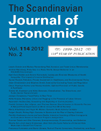
SCANDINAVIAN JOURNAL OF ECONOMICS
Exploring the Frontiers of EconometricsSCANDINAVIAN JOURNAL OF ECONOMICS (ISSN: 0347-0520, E-ISSN: 1467-9442), published by Wiley, stands as a pivotal platform for disseminating research in the fields of economics and econometrics. With an impressive Q1 ranking in both disciplines, this journal plays a critical role in advancing theoretical and applied economic research, catering to an international audience of scholars, practitioners, and students. Its coverage from 1977 to 2024 demonstrates a robust commitment to publishing high-quality research that influences both policy-making and academic inquiry. Although it operates on a traditional subscription model, the journal remains accessible to a broad readership, which is essential for fostering knowledge sharing within the economics community. As such, the SCANDINAVIAN JOURNAL OF ECONOMICS is an essential resource for those seeking to explore the latest developments and methodologies in economic research, helping to bridge practical insights with academic rigor.

World Competition
Fostering Scholarly Excellence in Economic and Legal ResearchWorld Competition is a distinguished academic journal published by KLUWER LAW INT, focusing on the dynamic interplay between law and economics. With its ISSN 1011-4548 and E-ISSN 1875-8436, the journal aims to disseminate high-quality research that explores competitive markets, regulatory frameworks, and economic theory, therefore making significant contributions to the fields of Economics and Law. Situated in the Netherlands, the journal is strategically positioned within a vibrant academic milieu, ranking in the upper quartiles of both categories - Q3 in Economics and Econometrics and Q2 in Law as of 2023. The journal serves as a vital platform for researchers, legal professionals, and students keen on understanding the complexities of competition policy and economic regulations. While it does not offer Open Access options, it remains committed to rigorous peer review and scholarly excellence, making it an essential resource for anyone interested in the evolving landscape of global competition law and economics. With converged years from 2016 to 2024, the journal reflects contemporary issues and trends, ensuring its relevance in today’s fast-paced academic environment.

REVIEW OF INDUSTRIAL ORGANIZATION
Shaping the future of organizational behavior and strategy.REVIEW OF INDUSTRIAL ORGANIZATION, published by SPRINGER, is a premier journal dedicated to advancing the field of industrial organization and related disciplines. With its ISSN 0889-938X and E-ISSN 1573-7160, this esteemed publication supports the dissemination of high-quality research from 1984 to the present, encompassing a wide range of topics such as economics, technology management, and organizational behavior. Positioned in the Q2 category across multiple disciplines, including Economics and Econometrics, Strategy and Management, and Organizational Behavior, it reflects its impactful contributions to academia and business practice. The journal provides valuable insights for researchers, practitioners, and students interested in the dynamics of market structures, competition, and regulatory issues. As part of the Scopus database, it ranks favorably, allowing authors to contribute to a recognized platform that drives innovation and policy in the industrial sector. While it does not offer open access, the journal's robust editorial standards ensure that published work meets rigorous scholarly criteria, making it an essential resource for those aiming to deepen their understanding of industrial organization.

Annals of Economics and Finance
Empowering Economic Insights, Shaping Financial Futures.Annals of Economics and Finance is an esteemed academic journal published by Wuhan University Journals Press, focusing on the fields of Economics and Finance. Established in 2000, this journal serves as a platform for scholars to disseminate their research findings and insights, contributing to the development of these disciplines through rigorous peer-reviewed articles. Despite currently holding a Q4 ranking in both Economics and Econometrics and Finance categories (2023), it strives to enhance its impact on the academic community and policy-making audiences. While not Open Access, the journal seeks to cultivate a deeper understanding of vital economic theories and financial practices, thereby offering invaluable resources for researchers, professionals, and students alike. With its broad scope, the Annals of Economics and Finance is poised to play a crucial role in shaping contemporary economic discourse up to 2024 and beyond.